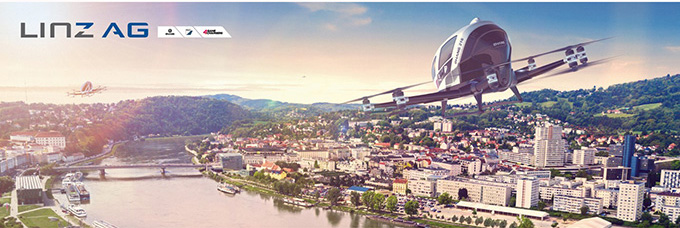- UAM pilot city partnership with Linz, Austria
- EHang 216 autonomous aerial vehicle to take off in Linz soon
Vienna, Austria, August 14, 2020 -- EHang Holdings Limited (Nasdaq: EH) (“EHang” or the “Company”), the world's leading autonomous aerial vehicle (“AAV”) technology platform company announced the latest progress of implementing a trial UAM operation in Austria’s third largest city of Linz, the first of its kind in Europe, under its UAM pilot city partnership with Linz AG. At the recent global Urban Air Mobility (UAM) Virtual Conference held by the Aviation Week Network, the Chief Marketing Officer of EHang Europe Andreas Perotti shared the Company's UAM use cases in varied scenarios and efforts to drive forward UAM implementation in Europe. EHang expects to soon start the trial UAM operation with EHang 216 in Linz, Austria.

Growing urban population is causing serious traffic jams in major cities around the world. Protecting the air and eliminating CO2 emissions is giving birth to Urban Air Mobility, a new solution to transporting passengers or goods with autonomous aerial vehicles within or between cities.
In light of the disruptive potential of UAM, EHang established strategic partnerships in 2019 with FACC and LINZ AG, local partners with rich experience in urban public transportation and charging infrastructure. The three parties agreed to join hands in building Linz into a UAM pilot city. They will conduct passenger flights and goods transportation with autonomous air taxis in urban areas.
Suitable eco-friendly electric motors and powerful batteries with short charging times already exist. So far, stable 5G infrastructure is available to ensure real time communication and precision for navigation during flight and landing. Next, a suitable testing route running over uninhabited areas to the vertiports will be determined within the city of Linz. While construction is planned for 2021, trial flights are planned in the near future.
In the course of the test flight, various aspects will be carefully studied including the practicality of implementation in urban areas, acceptance by the populace and the expected positive impact on the environment, and more. The project will be led by joint efforts from each partner bringing in their specific expertise. The public service aspect will also be considered, as UAM is not only about purchasing aircraft by private customers. Rather, public benefits are paramount, with a focus on integration into an overall transportation plan.
EHang Founder, Chairman and CEO Huazhi Hu said, “We will implement the whole value chain that is necessary for UAM operations, as well as demonstrate passenger experience journeys as well. Bookings systems, boarding processes and aftermarket service questions will play a role. In the course of the end-to-end process we will also be able to learn and improve our solutions on the go. We need to start thinking about implementation today, parallel to the ongoing regulatory processes as both will benefit from each other. Last but not least, we want to involve the people and let them touch, feel and experience UAM as far as possible today."
About EHang
EHang (Nasdaq: EH) is the world's leading autonomous aerial vehicle (AAV) technology platform company. Our mission is to make safe, autonomous, and eco-friendly air mobility accessible to everyone. EHang provides customers in various industries with AAV products and commercial solutions: air mobility (including passenger transportation and logistics), smart city management, and aerial media solutions. As the forerunner of cutting-edge AAV technologies and commercial solutions in the global Urban Air Mobility (UAM) industry, EHang continues to explore the boundaries of the sky to make flying technologies benefit our life in smart cities. For more information, please visit www.ehang.com.
Safe Harbor Statement
This press release contains statements that may constitute “forward-looking” statements pursuant to the “safe harbor” provisions of the U.S. Private Securities Litigation Reform Act of 1995. These forward-looking statements can be identified by terminology such as “will,” “expects,” “anticipates,” “aims,” “future,” “intends,” “plans,” “believes,” “estimates,” “likely to” and similar statements. Management has based these forward-looking statements on its current expectations, assumptions, estimates and projections. While they believe these expectations, assumptions, estimates and projections are reasonable, such forward-looking statements are only predictions and involve known and unknown risks and uncertainties, many of which are beyond management's control. These statements involve risks and uncertainties that may cause EHang’s actual results, performance or achievements to differ materially from any future results, performance or achievements expressed or implied by these forward-looking statements.